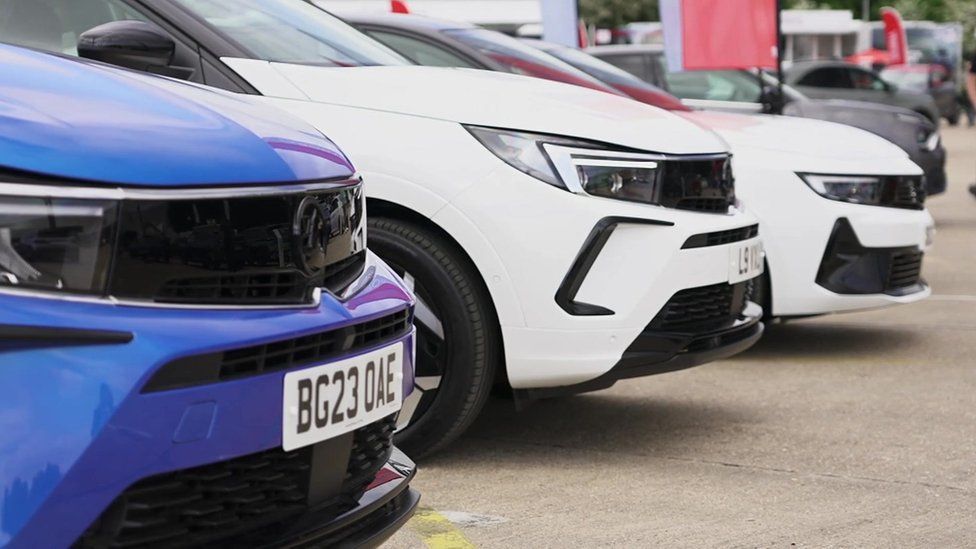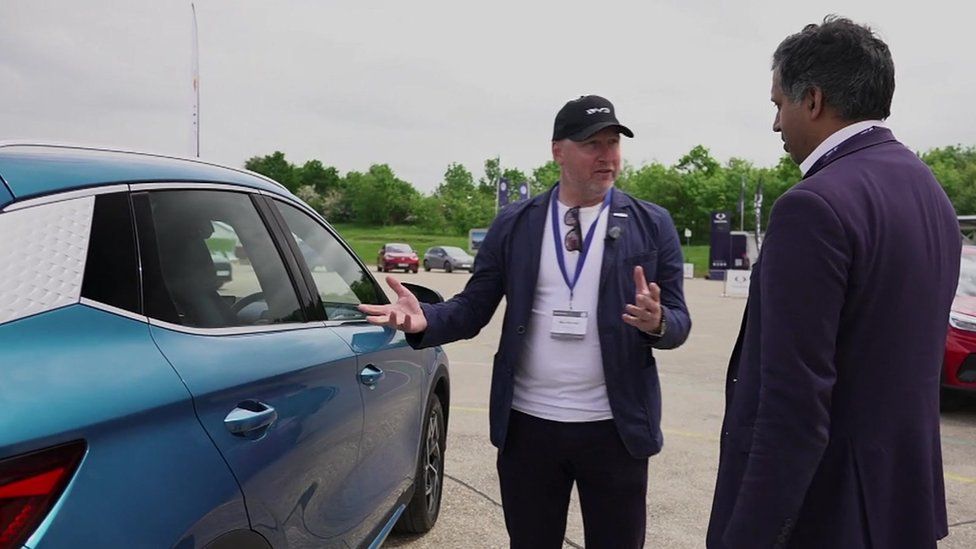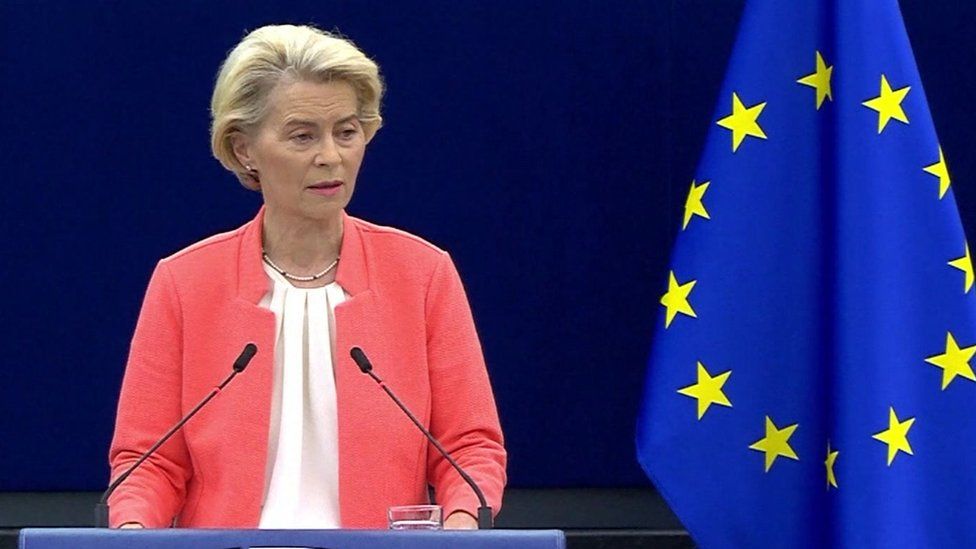Chinese electric cars will reduce UK emissions but what about rivals here?
-
Published
Related Topics


The UK is facing a dilemma: should it fight the rising imports of Chinese electric cars with big new tariffs, in the same way the EU has threatened to do this week? Or should it allow them to continue? Keeping open to the imports in would make it easier for the UK to hit its goal of no new petrol and diesel cars by 2030, and it would make electric cars cheaper. But the UK car industry could be damaged.
The British car industry is showing off its green electric future at a Bedfordshire racetrack, and behind the marques, some familiar, some less so, there is a new force.
China is cornering the market in electric vehicles.
A friendly man from Chinese firm BYD shows me the Atto.
“We’re really proud of this car,” says Mark Blundell. “It’s new to the market, and packed full of technology. In simple terms we can pack 50% more battery into less space.”
The car’s interior is inspired by a gym. It has a heat pump as standard, vegan leather, and strings on the door map-pocket tight enough to “get a tune out of”. The display screen on the dashboard rotates at the press of a button.
For now, hands should still be on the steering wheel, though China expects to be ahead of the game on autonomous driving too.
And the all important battery life and range? Impressive.
China has cornered the market in electric vehicle batteries. Indeed, many of the new car companies, including Byd, started off as battery manufacturers.
BYD stands for “Build Your Dreams”, and they are on course to overtake Tesla as the world’s biggest producer of electric vehicles this year. If hybrids are included, they are already number one.

BYD, long-backed by legendary US investor Warren Buffett, has just started selling in the UK, and recently wooed the Munich motor show with six models heading for Europe.
Other Chinese brands, such as FunkyCat and Nio, are not yet as well known in Europe.
There are also more-established brands, such as the Volvo-linked Polestar, and the formerly Oxford-based MG cars, which are being shipped from China.
Moreover, most Teslas in the UK in recent years have been shipped from China, made in the Shanghai Gigafactory that was built in six months in 2019.
In total, China has already overtaken Germany for overall global car exports, and will overtake Japan this year, becoming the world’s top exporter, according to figures from Moody’s Analytics.
This is no accident according to Andy Palmer, the former Aston Martin and Nissan boss.
“Twenty years ago, I was sitting on the board of [Chinese carmaker] Dongfeng. It was the decree of the Chinese government that Chinese car companies needed to leapfrog over western companies and the best way of doing that was to adopt new energy vehicles, as they called them at the time. That ultimately, of course, meant battery-electric vehicles,” he says.

That strategic planning for dominance in this sector meant China carved up capability on batteries, motors and the raw materials supply chains stretching across the world.
Now the scale they have, combined with subsidies, mean Chinese manufacturers are able to undercut other global players, Mr Palmer says.
It is also important to note that there are fundamental differences between the production of an electric vehicle and a conventional combustion engine car.
Much more of the car’s value is in the battery, compared to the value of the engine in relation to the rest of the car.
The technology and transmission is more straightforward too. If you have the batteries, it is far easier to add wheels and the technology around it.
Companies like BYD are ahead of the game when it comes to innovative battery technology, and are achieving ranges of as much as 400 miles without the use of cobalt and nickel. Both rare metals pose acute supply and environmental challenges, cobalt thanks to its connection with conflict in the Democratic Republic of Congo and nickel given its dependence on Russia.
But the bottom line is that the cars perform well and look the part, being sold at competitive prices.
As Jon Bentley, author of Autopia and presenter of the Gadget Show says: “[Chinese imports] could really change the European market quite considerably in a way the Japanese car industry did in the 70s and 80s.
“Given that it’s the price that is stopping many of us adopting electric cars, they are potentially a huge market force that we’re about to discover being unleashed upon us”.
Eliminating new combustion engine vehicles over the next decade is the single biggest contributor to the government’s path to net zero. So cheaper Chinese models could play a big role in the same way cheaper solar panels did.
On the other hand, even if tariffs are applied to Chinese imports, the European and British car industry may struggle to compete.
A car industry veteran told me earlier this year that Chinese firms were “sewing up the dealerships”.
Chinese companies have chosen to expand their exports into Europe and the rest of the world, but not into the US.
So it was striking and inevitable that the European Union announced a new probe into Chinese electric vehicles this week.
The European Commission President Ursula von der Leyen said they had not forgotten how the solar industry was affected by China’s “unfair trade practices”.
“Many young businesses were pushed out by heavily-subsidised Chinese competitors. Pioneering companies had to file for bankruptcy. Global markets are now flooded with cheaper Chinese electric cars. And their price is kept artificially low by huge state subsidies. This is distorting our market,” she said.

In the industry, this is seen as a mainly French push, with the Germans a little more sceptical.
German industry is more invested in tie-ups with Chinese industry and its premium brands stand to suffer the most if what began this week escalates into a trade war.
The Chinese government hit back, calling the investigation “a naked protectionist act”.
The process takes just over a year, and could lead to extra, even punitive tariffs, levied on car imports into Europe.
It raises the question of what might happen here in the UK.
The independent Trade Remedies Authority, the post-Brexit organisation responsible for assessing unfair trade, said it has “invited” carmakers to make a complaint and supply data showing harm done by subsidised Chinese electric vehicles.
Neither the industry body, nor individual carmakers have done so, so far.
But some in the industry say that if the EU were to apply punitive tariffs, then China’s export drive could be refocused on the UK.
The government does reserve some powers to act on trade defence issues.
It is intriguing that the Business and Trade Secretary Kemi Badenoch did this week cite competition from China in her push to get the EU to delay the Brexit trade deal restrictions on the electric vehicle trade.
But there is an extra twist on this issue for carmakers in Britain, which some privately describe as “farcical”.
In a few weeks’ time the government will introduce its Zero Emissions Vehicle (ZEV) mandate, designed to force carmakers down the path towards hitting targets to eliminate the sale of the combustion engine.
If a car company misses its target that 22% of its sales are electric, starting in January, it will either face fines of £15,000 per vehicle, or have to buy a surplus credit from a company that has sold lots of electric vehicles.
It happens to be the case that the Chinese-made import brands are mainly all electric.
The net result of all this, fear some in the car industry, is a system where existing UK manufacturers, including of hybrid cars, will pay thousands of pounds to subsidise electric imports.
Essentially, UK factories, which face competition from Chinese electric imports, could have to subsidise them.
While this is not the intention of the policy it could be the inadvertent effect.
The government has not yet published its response to a consultation on this that closed four months ago.
The expectation in the industry is that sufficient flexibilities will be introduced to prevent this issue.
But the system is just weeks away from being introduced. And it is clear that the general architecture of the ZEV mandate is designed to provide a carrot for electric importers, including from China, and a stick for actual producers of existing cars in the UK.
Right now, the EU is looking at restricting Chinese electric vehicle sales, whereas the UK could inadvertently be subsidising them.
Is this part of a conscious post-Brexit strategy to help the British consumer, with an anti-protectionist free trade approach? Does the route to mass adoption of zero carbon technologies go through Shanghai?
None of this is happening in a vacuum. Apart from the commercial challenge, many in Parliament are distinctly uneasy about aiding Chinese dominance in a sector as totemic and strategic as the automotive industry.
Are cars different from TVs and Iphones, or more like semi-conductors, 5G infrastructure and energy?
The strategic question is how China cleaned up with two decades of long-term planning on electric cars and their batteries, on a clear and predictable consequence of a net zero agenda pushed by the G7 western nations.
The more immediate question for Britain is whether we go for cheaper Chinese imports to aid mass adoption of a key net zero technology, or prioritise domestic production.
Related Topics
